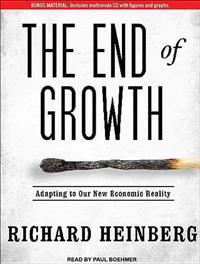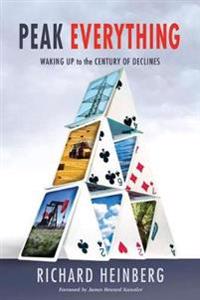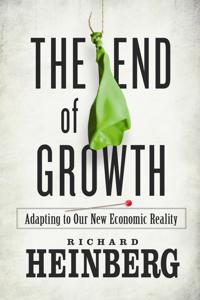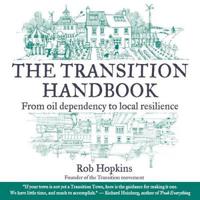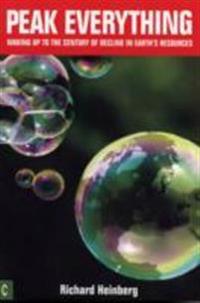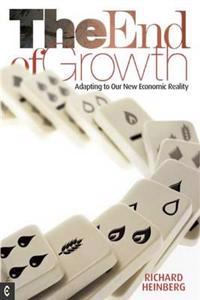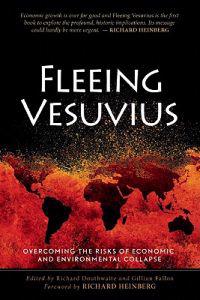The Post Carbon Reader (Pocket)
avRichard Heinberg, Daniel Lerch, Richard Heinberg
ISBN: 9780970950062 - UTGIVEN: 201010In the 20th century, cheap and abundant energy brought previously unimaginable advances in health, wealth, and technology, and fed an explosion in population and consumption. But this growth came at an incredible cost. Climate change, peak oil, freshwater depletion, species extinction, and a host of[...]
The End of Growth (CD-bok)
avRichard Heinberg, Paul (NRT) Boehmer, Richard Heinberg
ISBN: 9781452605906 - UTGIVEN: 2011-12Economists insist that recovery is at hand, yet unemployment remains high, real estate values continue to sink, and governments stagger under record deficits. The End of Growth proposes a startling diagnosis: humanity has reached a fundamental turning point in its economic history. The expansionary [...]
Powerdown: Options and Actions for a Post-Carbon World (Häftad)
avRichard Heinberg
ISBN: 9780865715103 - UTGIVEN: 2004-09This stark look at prospects for a truly sustainable culture speaks frankly about how it is time to "Powerdown," or to reduce per-capita resource usage in wealthy countries, develop alternative energy sources, and much more.[...]
Party's Over (Häftad)
avRichard Heinberg
ISBN: 9780865715295 - UTGIVEN: 200507The world is about to run out of cheap oil and change dramatically. Within the next few years, global production will peak. Thereafter, even if industrial societies begin to switch to alternative energy sources, they will have less net energy each year to do all the work essential to the survival of[...]
Peak Everything (Häftad)
avRichard Heinberg
ISBN: 9780865716452 - UTGIVEN: 201010The 20th century saw unprecedented growth in population, energy consumption and food production. As the population shifted from rural to urban, human impacts on the environment increased dramatically. The 21st century ushered in an era of declines, including: oil, natural gas and coal extraction yea[...]
End of Growth (Häftad)
avRichard Heinberg
ISBN: 9780865716957 - UTGIVEN: 201108Economists insist that recovery is at hand, yet unemployment remains high, real estate values continue to sink, and governments stagger under record deficits. "The End of Growth" proposes a startling diagnosis: humanity has reached a fundamental turning point in its economic history. The expansionar[...]
Afterburn (Pocket)
avRichard Heinberg
ISBN: 9780865717886 - UTGIVEN: 2015-03Climate change, along with the depletion of oil, coal, and gas, dictate that we will inevitably move away from our profound societal reliance on fossil fuels; but just how big a transformation will this be? While many policy-makers assume that renewable energy sources will provide an easy "plug-and-[...]
The Transition Handbook (Pocket)
avRob Hopkins, Richard Heinberg, Rob Hopkins
ISBN: 9781900322188 - UTGIVEN: 200809We live in an oil-dependent world, and have got to this level of dependency in a very short space of time, using vast reserves of oil in the process without planning for when the supply is not so plentiful. This book guides communities to begin an 'energy descent' journey.[...]
Party's Over (Häftad)
avRichard Heinberg
ISBN: 9781905570003 - UTGIVEN: 200510Dealing with the imminent decline of cheap oil, this book shows how oil and war have been closely related in the 20th century. Tracing the crucial role of fossil fuels in the rise of industrialism, it discusses the degree to which energy alternatives can compensate for oil, and recommends a global p[...]
Oil Depletion Protocol (Häftad)
avRichard Heinberg
ISBN: 9781905570041 - UTGIVEN: 200610Since oil is the primary fuel of global industrial civilization, its imminent depletion is a problem that will have a profound impact on every aspect of modern life. This book attempts to describe an accord whereby nations would voluntarily reduce their oil production and oil imports according to a [...]
Powerdown (Häftad)
avRichard Heinberg
ISBN: 9781905570102 - UTGIVEN: 200707Includes an overview of the likely impacts of oil and natural gas depletion and then outlines four options for industrial societies. This book explores how three important groups within global society - the power elites, the organized opposition to the elites (the 'activist' movements), and ordinary[...]
Peak Everything (Häftad)
avRichard Heinberg
ISBN: 9781905570133 - UTGIVEN: 2007-11The 20th century saw unprecedented growth in population, food production and energy consumption. As the population shifted from rural areas to urban cities, the human impact on the environment increased dramatically. This book addresses various cultural, psychological and practical changes we need t[...]
Blackout (Häftad)
avRichard Heinberg
ISBN: 9781905570201 - UTGIVEN: 200906Coal looks like a solution to many of our energy problems. This title focuses on the tough energy questions that dominate every sphere of public policy throughout the first half of this century. It is suitable for educators and those concerned about energy security, oil depletion and climate change.[...]
The End of Growth: Adapting to Our New Economic Reality (Häftad)
avRichard Heinberg
ISBN: 9781905570331 - UTGIVEN: 201110Economists insist that recovery is at hand, yet unemployment remains high, real estate values continue to sink, and governments stagger under record deficits. "The End of Growth" proposes a startling diagnosis: humanity has reached a fundamental turning point in its economic history. The expansionar[...]
Fleeing Vesuvius (Pocket)
avRichard (EDT) Douthwaite, Gillian (EDT) Fallon, Richard (FRW) Heinberg
ISBN: 9780865716995 - UTGIVEN: 2011-04The financial crisis that has blighted the world's richest countries since 2008 was a turning point in human history because it ushered in an era in which economies will tend to shrink rather than grow. Incomes will decline because the natural resources required for growth - particularly oil, the li[...]


